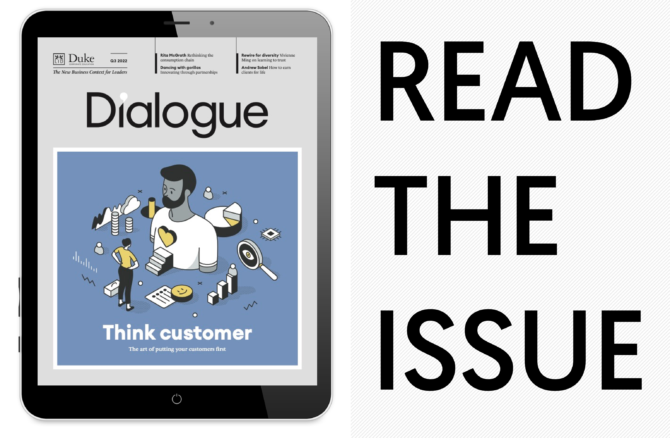Digital technologies and the data they generate give companies the opportunity to know more about their customers than ever before – more, perhaps, than customers know about themselves. But how many businesses consistently use that capability to guide key decisions across their organizations?
Too few, is the short answer. It is all too easy for companies – especially mature organizations with layers of bureaucracy and long-standing ways of doing things – to lose sight of the prize, leaving the door wide open for more customer-responsive competitors to grab market share.
That’s the problem at the heart of the Focus section in this issue of Dialogue.
As digital transformation accelerates, it’s more important than ever for established businesses to look at themselves through the eyes of their customers. As our regular columnist Rita Gunther McGrath points out in an exclusive feature for this issue, more than two-thirds of online shoppers abandon their shopping carts without completing purchases. That simple act represents a huge missed opportunity for online retail businesses – but the reasons why can be varied and are not always obvious. Leaders may need to turn detective, suggests McGrath, to understand customers’ “jobs to be done”, and to find ways of tearing down the barriers that are holding the business back.
Ryan McManus, meanwhile, examines how value propositions are changing as business shifts from the analogue to the digital eras, and explains how leaders can focus on customer outcomes. In his latest article for Dialogue, B Joseph Pine II argues that leaders should focus on customization before turning to the almost unlimited potential of the digital world, in what he terms the Multiverse. And the renowned thinker on client relationships, Andrew Sobel, takes an alternative perspective. Click here to read his feature on the mindset shift that’s needed to build great relationships.
Elsewhere in this issue, we take a look at an important corollary of the focus on customers in the digital world. A basic fluency in the language of digital technology is an increasingly vital component of business leadership: can you speak data? Allison J B Chaney sets out seven questions for leaders to understand and set priorities for the powerful algorithmic recommendation systems that do so much to keep us hooked on the latest content, or browsing the latest retail offers. Saša Pekec meanwhile argues that the rise of big data has fundamentally changed how we should think about business decision-making. Indeed, digital transformation has shaken many established companies’ operating models to their very core. How should they respond? Not by trying to transpose the models developed by digital natives, warn Paolo Cervini and Gabriele Rosani.
Elsewhere, Joe Perfetti presents the 2022 results of his annual research on Financial Cycle Time. Click here to find out which companies top the tables and what we can learn from market leaders. We quiz marketing guru Philip Kotler on his new book, while Vivienne Ming offers a brilliant explanation of how we can rewire our brains to be more inclusive. And Sharon Belenzon explains why the US needs to boost corporate investment in science if it is to lead on the technologies such as quantum computing and AI that are set to define the decades ahead.
Finally, we are delighted to introduce Good Business, a new column from Duke CE’s chief executive, Sharmla Chetty. Click here to read the first Good Business entry examining the confluence of commerciality and societal benefit.
Enjoy the issue.

